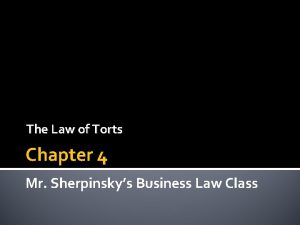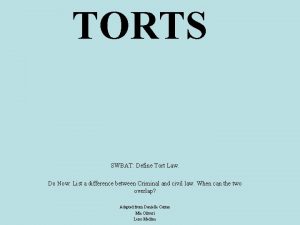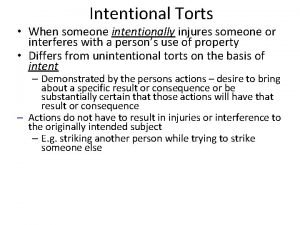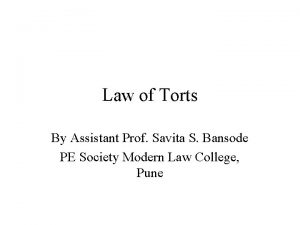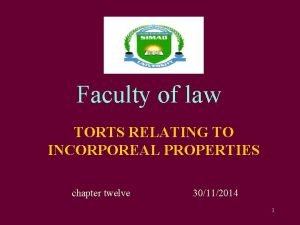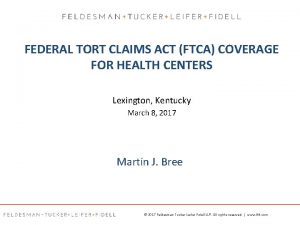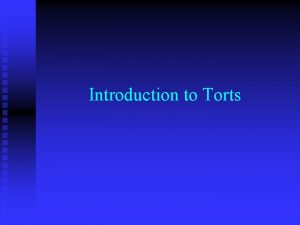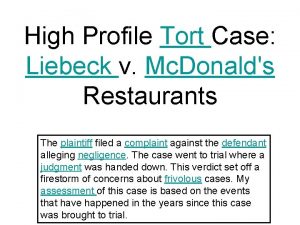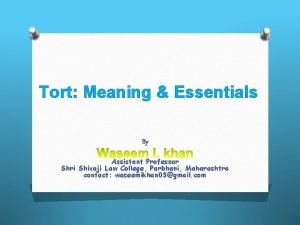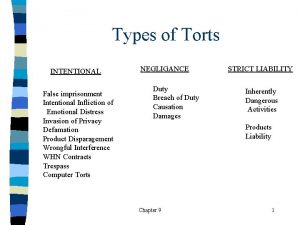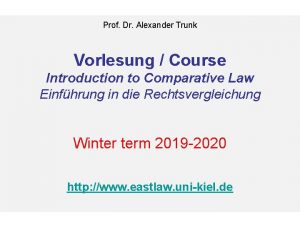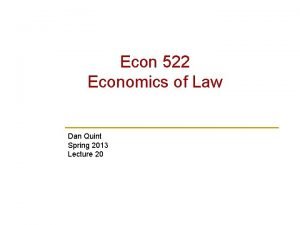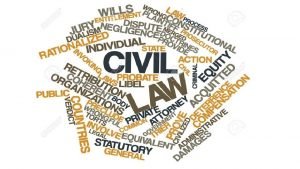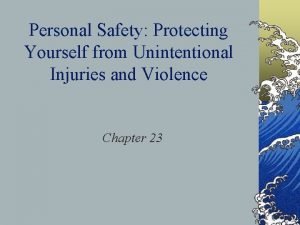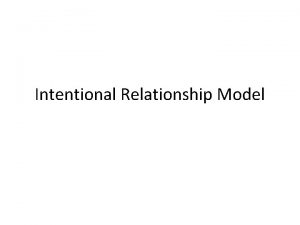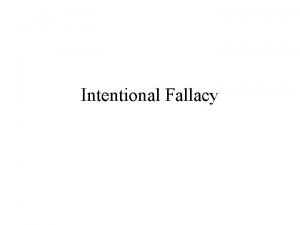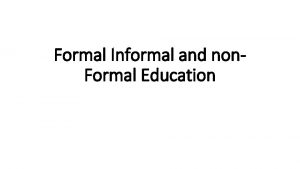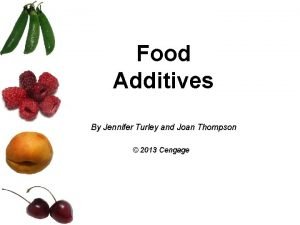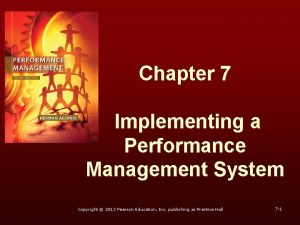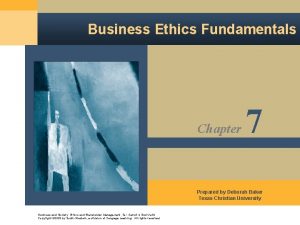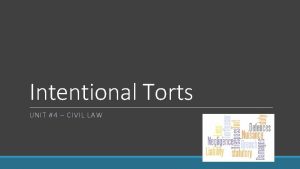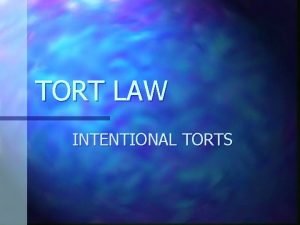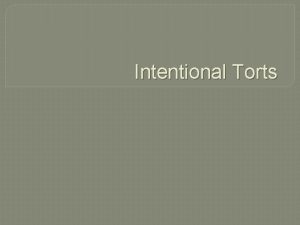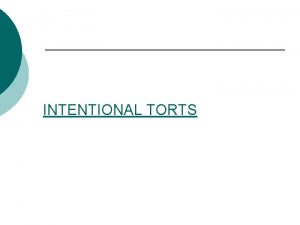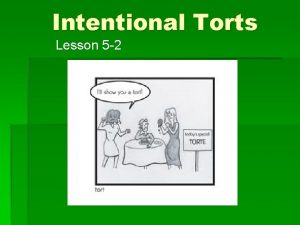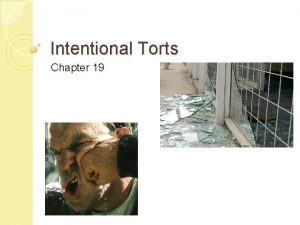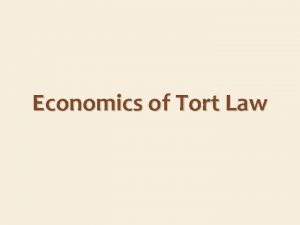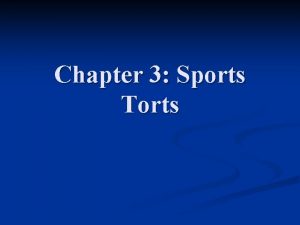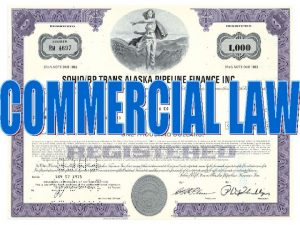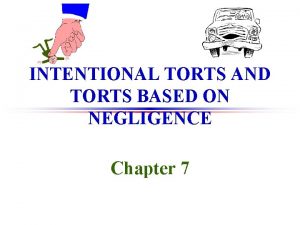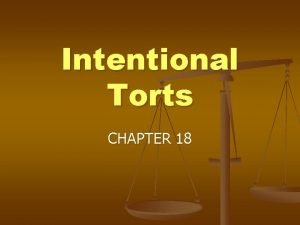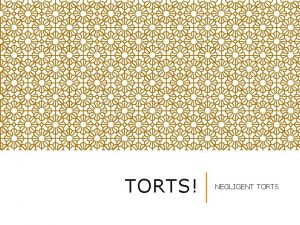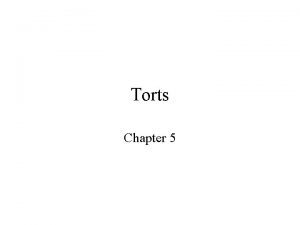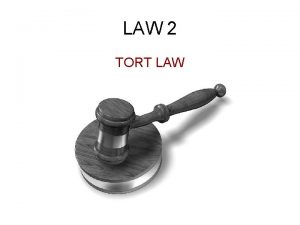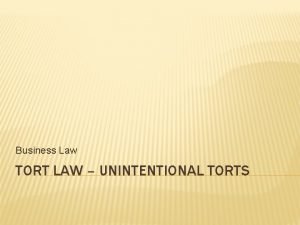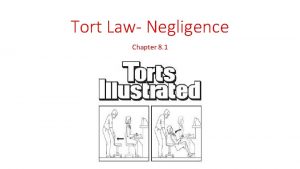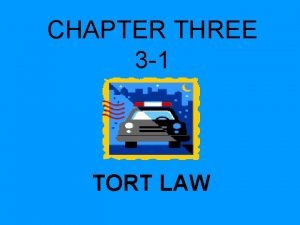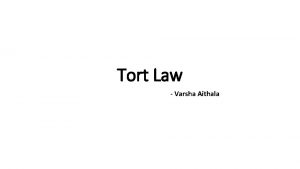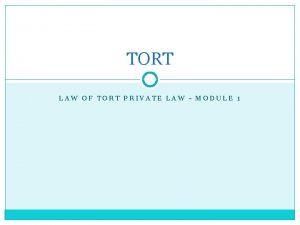Intentional Torts Tort Law A tort is a
























- Slides: 24

Intentional Torts

Tort Law ■ A tort is a harm for which the law provides a “civil remedy”. ■ Something someone else does that you can sue them for.

Intentional Torts ■ Actions that cause intentional injury to another person or their property. ■ Often these are also crimes. ■ The harmed person can sue, apart from any criminal proceedings.

Types of Intentional Torts ■ INTERFERENCE WITH THE PERSON ■ ■ ■ ■ Assault Battery False Imprisonment Malicious Prosecution Intentional Infliction of Nervous Shock Invasion of Privacy INTERFERENCE WITH PROPERTY ■ ■ ■ Trespass to Land Nuisance Trespass to Chattels

Assault ■ ■ Words or actions that cause a reasonable belief that the person intends to cause imminent harm. Belief must be genuine. Belief must be reasonable. Can sue even if no harm is caused

Battery ■ ■ Intentional harmful or offensive contact with another person without their consent. Sub-categories: ■ ■ Sexual Abuse (F. H. v. Mc. Dougall (2008) p. 446) Medical Battery (Reibl v. Hughes) ■ ■ Emergency Consent Malette v. Shulman (1990) p. 447

False Imprisonment ■ ■ Detaining a person without consent or legal authority. Most commonly occurs in store arrest cases.

Malicious Prosecution ■ ■ Charged with a crime with no reasonable grounds Motive must be malice or a desire to harm Criminal proceedings must be resolved in the defendant’s favour Defendant must have suffered damages

Intentional Infliction of Nervous Shock ■ ■ ■ Deliberately shocking someone through words or actions Shock causes victim to suffer mental or physical harm Wilkinson v. Downton [1897] p. 448

Invasion of Privacy ■ ■ ■ Filming or observing someone without their consent in a place where they have a reasonable expectation of privacy. Does not apply to public places. Does apply to homes and washrooms. Governed by the Privacy Act in BC L. A. M. v. J. E. L. I. (2008) p. 449

Types of Intentional Torts ■ INTERFERENCE WITH THE PERSON ■ ■ ■ ■ Assault Battery False Imprisonment Malicious Prosecution Intentional Infliction of Nervous Shock Invasion of Privacy INTERFERENCE WITH PROPERTY ■ ■ ■ Trespass to Land Nuisance Trespass to Chattels

Trespass to Land ■ Intentionally entering onto another person’s land ■ ■ ■ Without permission Without legal authority OR staying after being asked to leave

Nuisance ■ ■ Unreasonably interfering with another person’s right to “enjoyment of their property” Must be more than transitory

Trespass to Chattels ■ ■ Intentionally interfering with someone’s private property (i. e. possessions) If deprived of it, even temporarily, becomes conversion (tort equivalent of theft)

Defences to Torts ■ ■ Very Similar to Criminal Law Defences to Interference with the Person ■ Consent ■ ■ Volenti non fit injuria Self –Defence of a Third Party Legal Authority

Defences to Torts Defences to Interference with Property ■ ■ ■ Consent (see Minet v. Kossler on p. 455) Legal Authority Statutory Authority (with respect to nuisance)

Defamation of Character ■ ■ Defamation means injuring a person’s reputation or “good name” by spreading untrue and damaging information about them. Two types: ■ ■ Slander Libel

Slander ■ Defaming someone through oral statements or gestures

Libel ■ Defamation in permanent form – usually in writing.

Defences to Defamation ■ ■ Truth Fair Comment ■ ■ ■ Personal opinion on a matter of public interest Must be fair Must be made without malice

Defences to Defamation ■ Absolute Privilege ■ ■ Statements made in parliament or in court Qualified Privilege ■ ■ Limited protection for statements made without malice in certain relationships E. g. Employer reference

Review ■ ■ ■ Defamation Questions p. 462, QQ. 1, 3 - 6 PP. 463, QQ. 1 - 6, 9, 10 Quiz THURSDAY, based on questions


Questions ■ ■ ■ P. 444, Q. 3 P. 450, QQ. 2, 4 P. 453, QQ. 1, 3 P. 462, QQ. 1, 3 - 6 PP. 463, QQ. 1 - 6, 9, 10 QUIZ ON WEDNESDAY!!!!!
 Intentional injury examples
Intentional injury examples Definition of tort
Definition of tort Intentional tort
Intentional tort Chesmore vs richards
Chesmore vs richards Types of torts in healthcare
Types of torts in healthcare Example of incorporeal property
Example of incorporeal property Ftca gap coverage
Ftca gap coverage Torts class
Torts class Mc donalds tort
Mc donalds tort Bet tortlar
Bet tortlar Tort types
Tort types Tort in law
Tort in law Tort in law
Tort in law Tort in law
Tort in law Newton's first law and second law and third law
Newton's first law and second law and third law Si unit of newton's first law
Si unit of newton's first law Boyles law
Boyles law How to calculate boyle's law
How to calculate boyle's law Example of intentional injury
Example of intentional injury Therapeutic relationship model
Therapeutic relationship model Definition of intentional fallacy
Definition of intentional fallacy It is an intentional organized and structured
It is an intentional organized and structured Intentional food additives
Intentional food additives By and large what is the cause of intentional rating errors
By and large what is the cause of intentional rating errors Intentional amoral management model
Intentional amoral management model
